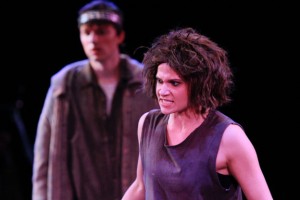Before the lights go up on Ithaca College’s production of “Electra” by Euripides, the faint echo of a rock scratching against a dull blade reverberates through the theater. It sounds eerie, almost barbaric.
Dim lighting reveals a man standing on a set of craggy rock beds, scraping a stone on his shiny blade. Shovels stick up from the battered ground. The set, the sounds and the atmosphere all set the strong tone of this sadistically dark production that opened last Thursday at the Clark Theatre in Dillingham Center.

Directed by Susannah Berryman, associate professor of theater arts, “Electra” is a classic Greek tragedy written nearly 3,000 years ago. The play centers on its titular character, played by senior Morgan Lavenstein. Electra’s mother, Clytemnestra, played by senior Emma Poole, has killed her husband, Agamemnon, and left the family behind to live lavishly with her lover, Aegisthus. After reuniting with her brother, Orestes, played wonderfully by sophomore Richard Lindenfelzer, Electra plots to avenge her father’s death by killing Clytemnestra.
Matricide, though seen occasionally in tragedies and ancient works of theater, is not always relevant to a contemporary audience. The majority of audiences won’t relate directly to Electra’s agonizing pain and desire for vengeance, but some might find a connection to the string of raw human emotion that each character shows.
Lavenstein, who is on stage for most of the play, makes the most of her stage time. She fully captures the bestial horror that Electra holds on her shoulders with a booming voice and commanding stage presence. Her descent into obsession of revenge becomes alienating but still strikes a sense of fear into the hearts of theatergoers. The audience sees and recognizes her pain, but the play makes no clear point as to whether this maddening frustration is as imminent in today’s time.
Her brutish take on Electra’s character is a near-perfect contrast to her peasant husband, played by sophomore Douglas Hansen. He plays the farmer Electra marries after being cast out of her mother’s rich home. His kind demeanor represents the kind of man Electra probably should fall in love with, but she is too blind-sided by her hatred to fully appreciate him. Hansen pulls off this nice-guy persona well with muted joy.
Euripides’ adaptation of “Electra” is often seen as a timeless tale of hatred, violence and family ties. It’s no surprise that the script leaves ample room for experimentation with the time and era the play is set.
Berryman’s production has no definite time period; throughout the play, characters wear everything from jeans and pencil skirts to Grecian attire and ragged frocks. Senior Kathryn Vega’s costumes perfectly match up with each character’s persona. For example, Clytemnestra’s cunning and materialistic behavior is reflected in her tight blue pencil skirt and jacket, her shoulders adorned with faux fur. Poole’s emotional portrayal of Clytemnestra gives a glimpse into the relationship between mother and daughter when the stakes are high and tensions mount, but her contemporary look seems out of place in the mishmash of time periods.
The play also features a traditional Greek chorus composed of six women speaking in unison as Electra’s story unfolds. They prance around the stage in mustard-colored sundresses, their cathartic tones adding a strange antithesis to the darkness of the play. But these ladies aren’t just full of happiness and praise to the gods. When the drama of “Electra” picks up, they get angry and mimic the tone and pace of each scene by stomping and screaming along with the characters. They’re a vital aspect of the production and showcase some brilliant staging by Berryman.
Though “Electra” falls short in the cohesiveness of its theme, it brings up some interesting points about the dark and barbaric nature in all of us.




